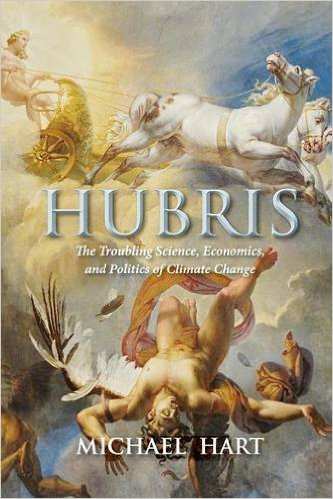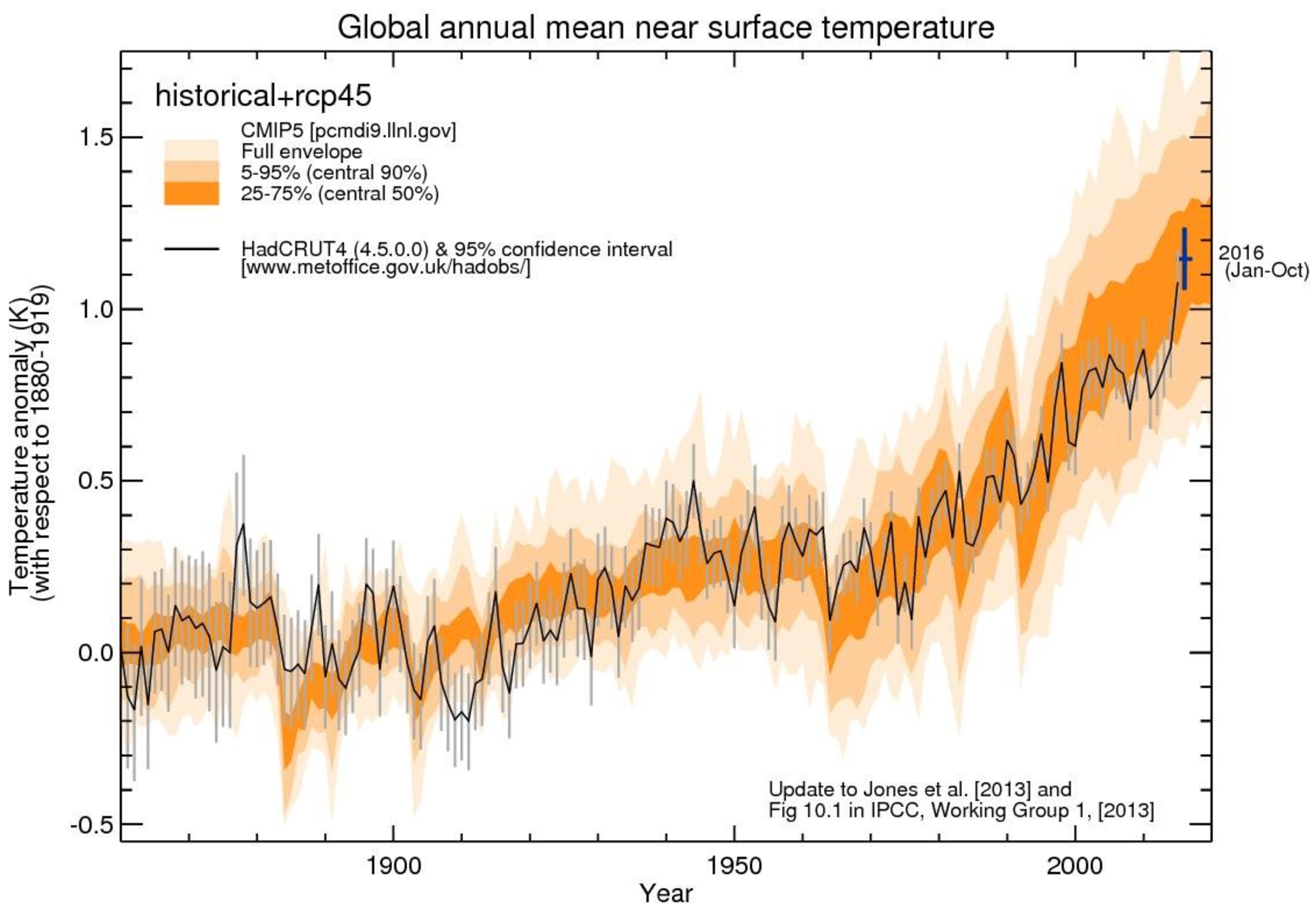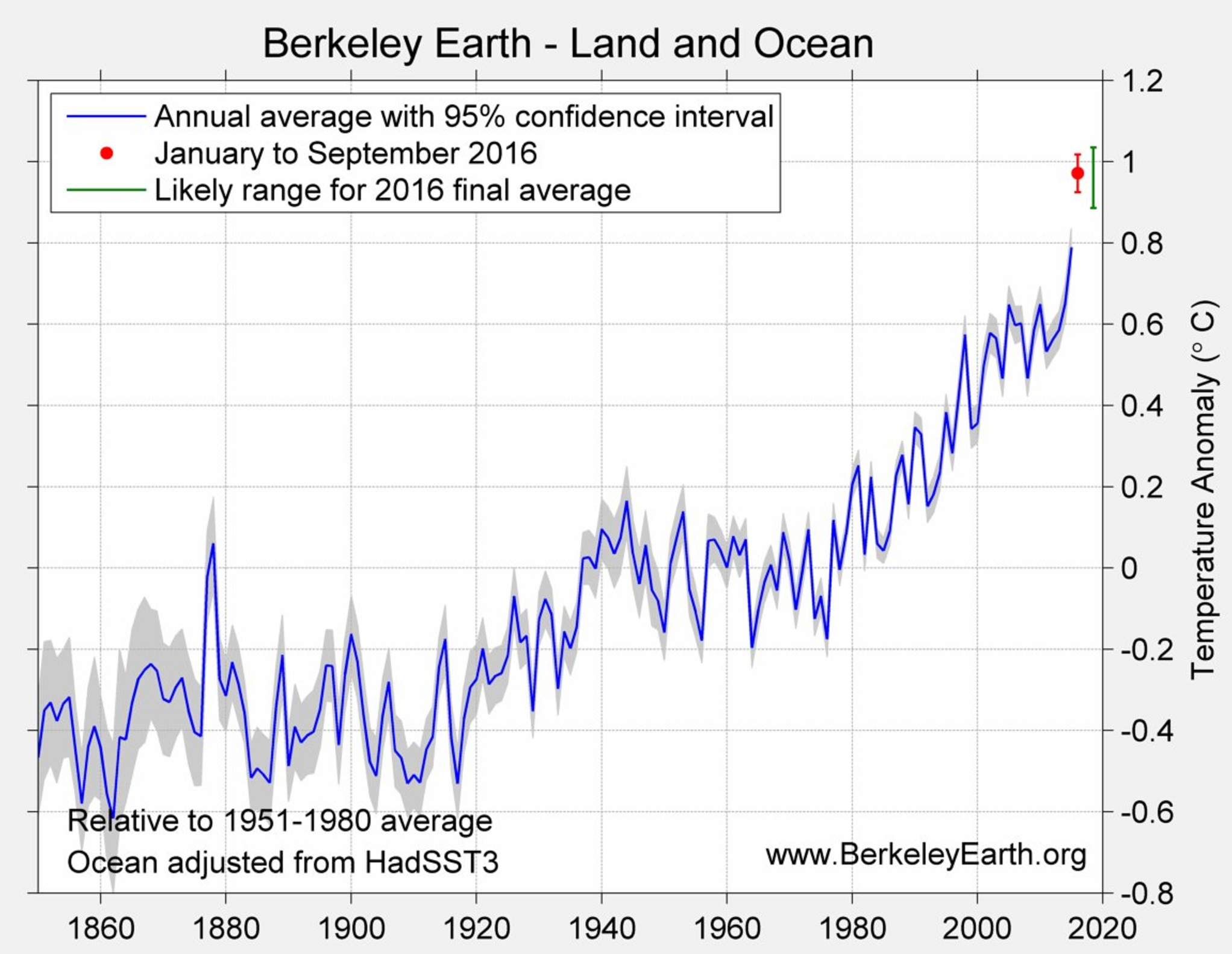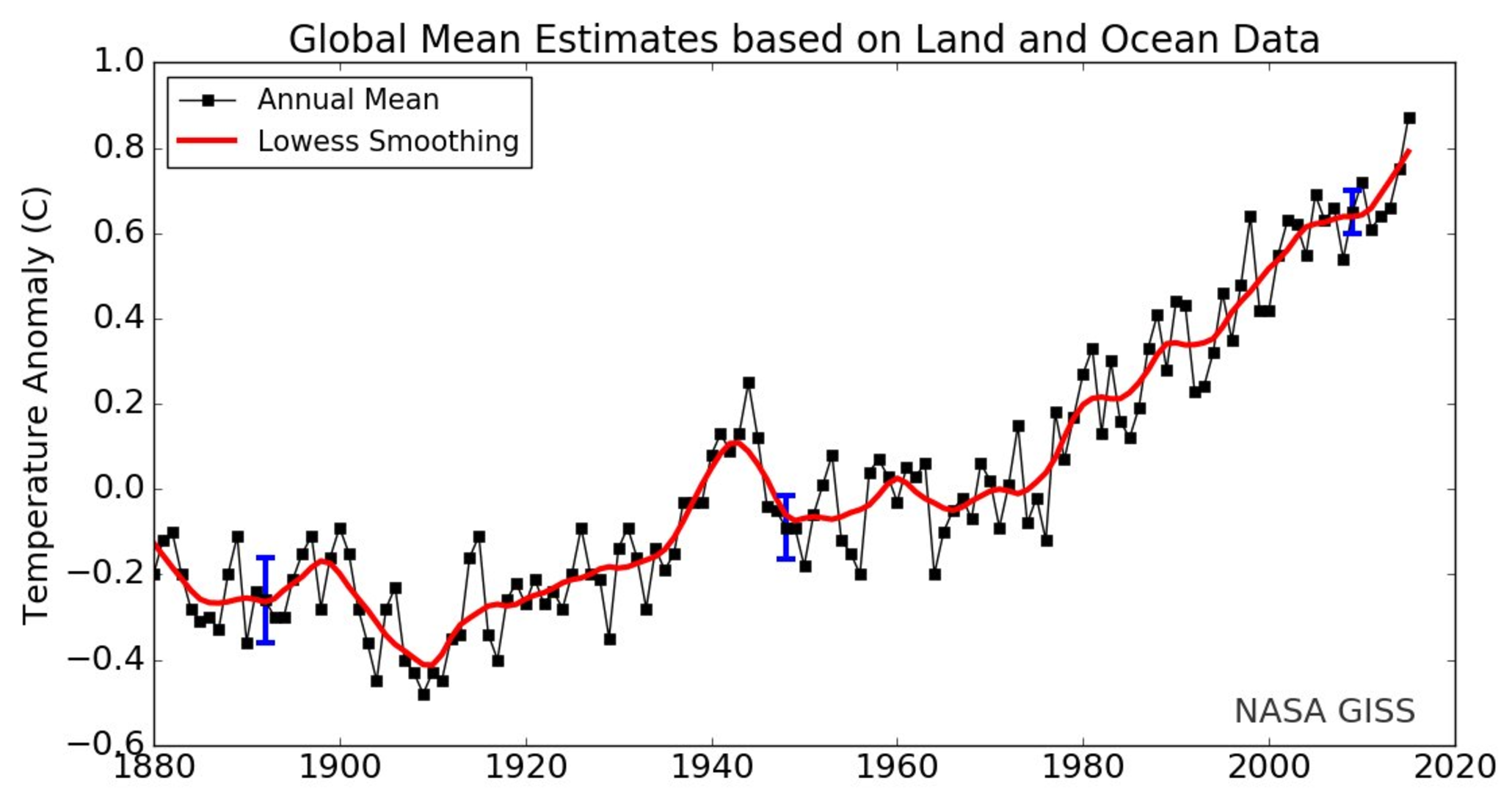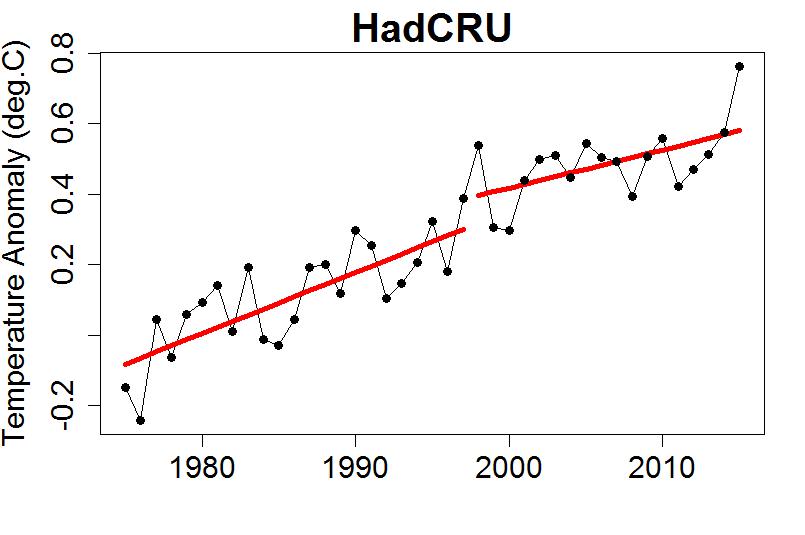Ed Wiebe
at the UVic Climate Lab
The Ironic Hubris of Michael Hart: Wrong About Climate Change
Libertarianism. A simple-mined right-wing ideology ideally suited to those unable or unwilling to see past their own sociopathic self-regard. -- Iain Banks*
"The planet does not have a temperature. You cannot stick a thermometer in somewhere and get the planet's temperature." -- Michael Hart
Yes, this is actually a direct quote. Hart takes the merit out of Professor Emeritus.I was directed to an interview with Michael Hart who has written a self-published homemade leafletbook called HUBRIS: The Troubling Science, Economics, and Politics of Climate Change. Based on the interview alone the homemade leafletbook is absolutely terrible and I will outline why below. In the preface to the homemade leafletbook Michael Hart makes some revealing and important comments.
MH: By 2010, I had read much more and discussed the issue more widely. Seventeen graduate students joined me in a summer seminar, reading a wide range of sources, making presentations, and discussing the science, economics, and politics of climate change. I enjoyed the seminar, as did they, and I repeated it in the summers of 2011, 2012, and 2013, and in the winter of 2015, involving 48 more students. For the last seminar, I circulated a draft version of this book as the basis for class discussion, much of which had been prepared during my 2013-14 sabbatical. In all five seminars, class discussion was lively, and the book benefited immensely from that discussion and from the presentations and reports prepared by the 65 students.
I do not actually know what Michael Hart has said to students but if it is anything like what he has said in the interview I found or in the snippets I read from his homemade leafletbook his possible use and misuse of his position as a professor emeritus to influence students appalls me and should appall you as well. I have taken quoted text, shown indented and in grey, directly from the interview. My comments follow each quote.
MH: relies on poor science advanced by activists to push an agenda. I learned that both domestic and international actors had succeeded in using the poorly understood science of climate change to advance an ambitious environmental agenda focused on increasing centralized control over people’s daily lives.
The science of climate change is not "poor" or "poorly understood". Climate Change is a mature field of research involving a wide range of disciplines. Its origins go back at least to Joseph Fourier in 1824. Furthermore, it's clear from this tiny fragment of text that whatever his intentions and experience Michael Hart is motivated by ideological considerations rather than evidence (e.g. "activists to push an agenda", "increasing centralized control over people’s daily lives"). Hart's personal or indeed any other political ideology is irrelevant. Science doesn't concern itself with what people believe nor does belief affect what is observed (climate is changing rapidly) and what is demonstrably the cause (human activities and especially burning fossil fuels).
Further evidence that Michael Hart simply doesn’t understand climate change and science in general is apparent in the following quotes. I’ve pointed out the errors or misapprehensions following each example.
MH: [Climate] is in a constant state of flux due to such factors as changes in the output of the sun, changes in Earth’s orbit around the sun, and oscillations in ocean heat uptake.
Hart has included this summary of concepts related to natural climate change over the Earth’s history to suggest he knows what he’s talking about. He doesn't.
MH: The alarm movement has taken one such factor
The term "alarm movement" is a dog whistle for people in similar ideological categories to him. It’s not the kind of term someone who understands climate change or is actually interested in a productive exploration of the economic consequences of climate change would use.
MH: the minor atmospheric greenhouse gas carbon dioxide
Carbon dioxide is a minor constituent of the atmosphere but it is not a minor greenhouse gas. Here Hart could have spoken to the faculty in the Department of Geography and Environment Studies at Carleton where a course called Weather and Water is taught in second year.
GEOG 2013 [0.5 credit] Weather and Water Introduction to climate, weather and the hydrological cycle. Physical properties of the atmosphere, radiation and energy balances, global circulation, atmospheric moisture and precipitation, weather systems and forecasting, mechanisms of climate change.
The physics and chemistry of carbon dioxide in the atmosphere and oceans is very well understood. Relatively small amounts of CO2 in the atmosphere are the principal cause of the warming we observe in the global climate system. Since Hart is using his lack of understanding of this as the basis for his homemade leafletbook, the homemade leafletbook is suspect and probably worthless. There are many, many resources available from credible sources that would help Hart understand this.
MH: to claim that human activity is changing the atmosphere to an alarming degree, leading inexorably to a much warmer climate.
Yes, it's true that the scientists "claim" that humans are altering climate. However, since this claim was first made in (at least) 1824 (Joseph Fourier) the scientific understanding of climate change, carbon dioxide and other greenhouse gases and the impacts of human activities has advanced to the point where we are certain enough. See for example, and for more references to research papers than you could ever wish to read, the 25 years of IPCC reports, then hold that research up against a homemade leafletbook like Michael Hart's. Hart might argue here that I am committing a terrible disservice to humanity by dismissing his arguments in this way. I'm not. He's wrong about climate change science.
MH: While increased atmospheric carbon dioxide – from .03 to .04 percent of the atmosphere – should lead to some warming, the extent of that warming within the context of a complex system that is in a constant state of flux due to numerous forcings and feedbacks is highly exaggerated.
This is simply false. Hart hasn't bothered to learn what we know, to ask any of the easily accessible experts near to hand. Michael Hart has assumed that he knows better than every major scientific body on Earth. Hubris indeed. See for example any introductory class on climate in an atmospheric science program at a university anyhere. Raymond Pierrehumbert (an expert) has written a beautiful summary article in Physics Today. There's also an interesting research paper in Nature showing the results of ten years of empirical observations directly linking observed changes in the atmospheric concentration of carbon dioxide specifically to observed changes surface energy balance. Hart could ask experts to help explain these papers and many, many more to him, or he could attend a first or second year course at a university but I believe he would simply not like what they told him as it would too inconvenient for his ideological position. The danger that Hart faces is that, though his homemade leafletbook will not be read widely, those who do read it will mostly be unable to accept the facts of climate change and will like and praise his homemade leafletbook because it synchronises nicely with their own beliefs.
MH: The best evidence indicates that the mild warming at the end of the 20th century was well within historical and geologic experience.
This is false. There is strong evidence that the rate of (global) warming in the past century exceeds any climate change in the past 11 000 years. There is evidence from specific sites (ice cores) that the recently observed warming is of the magnitude of past glacial/interglacial changes and that the rate is unprecedented for past million or so years at least and almost certainly even further back. One example in support of my claim is a paper by Marcott, et al, A Reconstruction of Regional and Global Temperature for the Past 11 300 Years, Science 393, 1198 (2013); DOI: 10.1126/science.1228026. Organisations like NASA have resources to help you understand the scale of past and present warming as well. But don't limit yourself to NASA. All of the major scientific bodies around the Earth have resources to help you learn.
MH: Over the first decade and a half of the 21stcentury, there has been no net warming.
This is false. See the attached figures showing observed global average surface temperature from several different international scientific bodies. The first four are from the UK Met Office, the Berkeley Earth project, The Japan Meteorological Agency, and NASA GISS. Click on the images for a high resolution version.
MH: The alarmist movement relies extensively on flawed computer models to make its case.
From the homemade leafletbook (p. 55): Areas that lend themselves particularly well to the claims of post-normal science are those for which direct observa and experimentation are not possible but for which computer models can be used as a virtual substitute.
This is false. Climate models are not flawed in the sense that he appears to believe they are. It is instead Michael Hart's understanding of what a model is that is flawed. All of the computer models used by scientists are well documented and the research undertaken to make them and the results they produce are published in peer-reviewed scientific journals. Mathematical models are used in all areas of science and computers are frequently used to find solutions to the equations, to explore the relationships between different properties of the models, and indeed to make discoveries. The relationships used in climate models are physical. That is they are based on known properties of nature explored via physics and chemistry. The models encode what we know and define relationships between differents parts of the climate system. Important components, for example radiative transfer in the atmosphere, use the same physics as is used in a vast array of other scientific and engineering applications that have nothing whatsoever to do with climate and climate change. The same is true for chemistry and biology. The problem may be that Hart doesn’t understand what all scientists know: all models are wrong, some models are useful. It's astonishing that someone with the necessary resources immediately to hand at a major university in the capital city of Canada could have so apparently willfully ignored the opportunities to learn. Hart should consult with some experts before speaking on the topic of climate change again. He won't though, because his ideological certainty prevents him from accepting what the science tells him. Finally, note another use of the dog-whistle term "alarmist".
MH: As UK science journalist Matt Ridley points out
Matt Ridley is, as Hart notes, a writer not a scientist. Ridley's opinion is irrelevant. Consider that the mention of a known climate change science denialist appeals to the intended audience for the homemade leafletbook and, presumably, Hart's ideological bent. Based on the names mentioned in the interview, in the preface to his homemade leafletbook, and in some of the quotes that precede chapters, one is forced to ask is Hart favouring ideology or science?
MH: More than one motivation drives the abuse of science. Among scientists, the primary reasons are money, career advancement, and prestige. In order to pursue their research programs, scientists need money from governments and foundations.
The implication here, with the word "abuse" is to suggest that scientists are simply doing whatever is needed to line their pockets with gold. This is nonsense. This sort of mistake could only come from someone with absolutely no relevant background and experience (see Hart's CV below). Scientists have flaws but science cannot tolerate wide spread abuse as is suggested here. It simply couldn't happen without a secret conspiracy invloving every scientist everywhere colluding to obfuscate and manufacture research. It is a risible notion.
MH: As I explain in my book, over the years, much of peer review has degenerated into pal review that maintains the dominant perspective.
From the homemade leafletbook's preface: Three anonymous readers provided comments for UBC Press, which decided not to proceed to its publication, despite their earlier successful experience with three of my previous books. As discussed in chapter three, peer review no longer serves the constructive role it may once have played.
I think those two quotes, from the interview and the preface of Michael Hart's homemade leafletbook are a good explanation for his strange notions about peer review. He got realistic, honest, and forthright reviews and he's quite petulant about it. Peer review worked as it should. Hart didn't take advantage of the opportunity that thoughtful criticism from reviewers provides to improve his work. Scientists do use peer review to improve their research. They use the reviews to improve their publications. Yes, some of that work is done simply to satisfy the reviewers but much of the extra work does result in better research that stands up better against further scrutiny.
Next, Hart does a bit of crabby old dissenter scientist name dropping in the interview, invoking Freeman Dyson and others. Dyson is (was?) a brilliant physicist who made very important contributions to science. However, that record of past achievements does not make him an expert on climate. Dyson is wrong about climate change.
MH: For some, such as movement leaders, UN officials, and many politicians, the issue is being cynically exploited to advance their agenda of greater control over human lives.
The idea that the UN and "left-wing politicians" (a term used elswhere in the interview) are working on an agenda of control over people's lives is a well-known conspiracy theory. It is a sort of catch-all for libertarians and other extreme right agitators. They frequently use the the catch phrase Agenda 21 online. That this kind of conspiracy nonsense would even be hinted at only serves to demonstrate that Michael Hart is truly worthy of the distinction of cranky bearded old white emeritus professor. I am very concerned that this is the kind of thing he shares with students.
Asked if climate change is just another alarmist fad MH responds: I believe it is a similar phenomenon, but one that has captured the imagination and concerns of more people and has more support among elites.
Need one say anything about this at this point? Of course it's captured the imagination of people and has support among the well-educated, it is a fact. One mention of the word "elites" is enough I think to tell a whole story about making evidence to suit one's ideology.
They next quote is long but I feel it's necessary to give the whole context. The question comes first, in bold with added italics for emphasis, then Michael Hart's response follows.
Q: You state that "official science," the alliance of governments and bogus science, is a form of immorality pretending to be virtue. You conclude the book with a warning: The apparently idealistic combat against climate change, you assert, may well prove to be the mechanism for ushering in a Utopia. You maintain that utopian dreams may appear in the beginning to be about freedom and quality of life and yet will degenerate into what you and other thinkers have called “totalitarian democracy” — which means the destruction of authentic liberal democracy. Is this inevitable?
MH: I am optimistic. I do not think its long-term success is inevitable, but it will take a determined effort by people of faith and conscience to point to its darker motives and its sinister exploitation of populist fears. We know from history that such movements have a predictable life cycle: They emerge with much enthusiasm among intellectual elites, they gain a broad following by focusing on alarmist predictions before becoming part of the political mainstream, and then decline into a minor movement among fringe intellectuals as a new alarm movement takes its place. The problem is that such movements can do a lot of damage and remain embedded within the intellectual community with the ability to rise, phoenix-like, as a new alarm. Former adherents of the eugenics movement and its successor, population control, for example, are now an integral part of the climate change alarm movement.
There is so much of interest here. We have the claim that official science is the alliance of governments and bogus science and that it is immoral. What does official mean? Real science? True science? Science conducted by trained experts? Or is it simply whatever scientific results that don't agree with Hart's personal opinions? And what about this question of morality? Does Hart mean to say that using facts, evidence, reason, and so on is immoral? Surely immorality comes into play when considering how we use what we know. And more significantly morality is important to consider when writing a homemade leafletbook that purports to explain climate change while ignoring what we know.
Then there appears to be (I haven't read the homemade leafletbook) an out of sorts for Hart ("may well prove to be the mechanism for ushering in a Utopia", but see cartoon below) though I may be misunderstanding that. Consider Hart's response. He has certainly confused two very different ideas. One is some notion of activism around the real issue of climate change. The other is the science of climate change itself. Which of these two is he referring to when he says "darker motives and sinister exploitation", "such movements have a predictable life cycle"? And with special interest we see his call to "people of faith and conscience" to act. Obviously people of faith have to do what their faith tells them, they are used to ignoring or not requiring evidence. But people of conscience are different. They ought to do what is right. What is right with regard to climate change is to look at the facts and evidence that support what the entire scientific body on Earth agree is true: Climate change is real, it is caused by human activity, it will harm many, many people, and we all need to act collectively.
But my absolute favourite part of the interview is the comparison he makes of climate change to eugenics. Hart has mentioned the cynicism of politicians with regard to taking advantage of people who may not be well informed about science but can't see it when he does it himself. It is absolutely repugnant.
I don't know anything about Hart's religious beliefs, if any, and I don't really care to know. This interview was conducted "during a conference on Catholic Perspectives on the Environment". Hart uses terms like post-Christian and faith so this may suggest that part of his ideological confusion is religious. That makes me wonder about questions of Christian morality and ethics in general. Ethically speaking Hart's position is hopeless. The right thing to do is to listen to experts when they show you what they know on a topic. Absolutely question the experts, challenge them, look for flaws in the work. But, to challenge someone you have to at least demonstrate to them and anyone else paying attention that you know something about the topic being discussed. Hart has not done that. Morally speaking he's wrong too. The moral thing for a Christian to do would be to think about the possibility of harm to millions of people from climate change first, then see what the experts tell you is at risk and what can be done, then act.
The argument is morally bankrupt, too. It excuses our bad actions by pointing to others who are doing worse things. We'd never say to our child: "It's okay to shoplift that chocolate bar, Johnny, because other people are stealing a lot more."
Yet some people are comfortable with the same moral reasoning when it comes to our carbon emissions, even though these emissions are relentlessly stealing our children's future well-being.
[Added 2017-01-02]: Canada must not give up the fight on climate change
the Obama administration has relied on stealth to implement its climate change agenda
Stealth? This is just stupid.
climate change has added to the momentum of the broader secularization of society and the pursuit of anti-human policies and programs.
Given that human-caused climate change is a fact this is just paranoia. Or, maybe it is real and insightful. No, I don't think so. Hart is just blaming other things on the so-called climate-change agenda and forgetting what the science tells us about the kind of problems humanity will really be trying to solve in the near future. It's a completely irresponsible position to take. And what about these "anti-human" policies? Who thinks like that? Not someone who actually cares about human welfare.
I think Pope Francis may have been motivated by the Church's concern for human life and other moral issues, but in commenting favorably on the climate change movement, he has opened himself up to charges of being naïve and unwise.
One of my favourite things to see is catholic believers (yes, presumed in this case) criticising the Pope on questions of morality. It really demonstrates how flimsy the whole edifice of faith really is.
the real issue is the hunger for power to change economic and political systems in order to achieve a wide-ranging agenda. In the words of former UNFCCC Secretary Christiana Figueres, the goal of "the whole climate change process is the complete transformation of the economic structure of the world."
I found a more legitimate source reporting this quote and a bit more context (of course there's more context). The quote Hart uses is easily found online but tellingly it is almost exclusively used by climate change deniers and peculiar right-wing political dissenters and outcasts. Figueres made a similar comment in April of 2013 and has repeated it in various forms since that time.
"There’s nothing that humanity has ever attempted that is of greater impact than what we’re trying to do right now," Figueres said. "This is a full transformation of the economic structure, of the energy system and of the economic logic that underpins growth. It’s a full transformation of social values and behaviors", Sydney Morning Herald.
Why would "a political movement exploiting fear of climate change to push a utopian, humanist agenda that most people would find abhorrent" be so open about this brazen attempt "to advance an ambitious environmental agenda focused on increasing centralized control over people’s daily lives."? It's because that's not what Figueres was doing. Instead she is trying to find language to communicate the magnitude of the problem we are collectively facing. What a reasonable, mature adult with an education takes from the sort of language that Figueres used is entirely different from what Hart wants to convey with his snippet.
At the end of Chapter 3 of his homemade leafletbook Michael Hart writes:
Many of the institutional and ideological problems discussed above are an integral part of climate science: insistence on consensus and the sanctity of peer review, the drive to gain and maintain funding, ... dependence on virtual science based on incomplete, questionable data, and heroic assumptions, reliance on advocacy science and observational studies, claims of post-normal science and the resort to official science. ... the scientific enterprise relies on two critical norms: rigorous adherence to a methodology that values experimentation, close observation, verification, quantification, replicability, and falsifiability, while at the same time maintaining a firm commitment to absolute honesty and scepticism in reporting the results. Many climate scientists, however, seem to have adopted a rather cavalier attitude to the demands of scientific methodology while vilifying scepticism and insisting on full acceptance of a consensus view of the issues. The result is a discipline easily exploited by those with sinister motives.
This could only be written by someone who reads far too many books on the philosphy of science and refuses to talk to working scientists from any field let alone those working on climate change. Contrary to the stunningly stupid quote I started this whole analysis with climate is studied with actual physical thermometers stuck into the Earth in various ways. On Hart's website for his terrible homemade leafletbook you can read "the importance of satellite data that do not show warming of the troposphere". Perhaps Hart doesn't realize that the satellites he praises do not use actual thermometers stuck into the Earth. Instead they use very complex computer models to change electromagnetic radiation measured by the satellite into an approximate temperature of a particular part of the Earth and atmosphere. His wrongness truly knows no bounds.
Hart also finishes his chapter with a frightening reference to sinister motives. Who writes like this? Someone with a strong ideological position concerned only with there own motives is a likely quess.
There really are only two choices that Michael Hart and his ilk can make: ignore the evidence and dream of a libertarian (or similar) future where no one has to take responsibility for anything, or recognize what we know and work to reduce the harm caused by human activities. Decent, thoughtful, rational, reasonable people are already working hard to change our systems to produce less carbon pollution because it's the right thing to do.
On Michael Hart's own site for his self-published homemade leafletbook he lists some reviews. They are written by:
- Dr. Helena Aves, retired geologist, "I am a geologist and have been studying this topic for over six years in a non-official capacity";
- G. Cornelis van Kooten, environmental economist, University of Victoria, "The author deals with the science and economics of climate change as one who really understands what he is talking about" (really?);
- Herman J. Dost, Thunder Bay, Ontario, "It is rare to read a book that is so scholarly" (expert opinion?);
- Andy Jones, Stony Plain, Alberta, "The book is self-published and Believers don’t stock the truth.";
- Richard Hofer, Montreal, "never, ever, rely on anything superficially reported. Always start with a reading of the complete document." (unless, apparently the document is inconvenient for you);
- William Bourke, Sydney, Australia, "an in depth and comprehensive rebuttal of the science";
- Rob Scalpel, Surry, BC, humorously writes "ClimateChange™", yes, with the little tradmark symbol.
Hart's background is in History, Mediaeval History, Political Science, English, and Philosophy, and Canon Law. These are not topics that necessarily lend themselves well to a book about what we should do about climate change. That's not to say that his background need be a barrier to writing an interesting important book on climate change though as shown above he does not seem to have overcome his lack of relevant background experience. There are many experts at Carlton and other nearby Universities whom he could have consulted about his homemade leafletbook but he apparently only selected those who fell neatly in line with his preferred point of view.
- Bachelor of Arts, Calvin College, Grand Rapids, Michigan (1965) Major: History Minors: Economics, Political Science, English, and Philosophy
- Postgraduate Studies, University of Virginia (1965-67) Major: Medieval and English History Master of Arts, University of Toronto (1968) Major: Medieval and English History
- Doctoral Studies, University of Toronto (l967-74); completed orals, but not dissertation Major: Medieval European History Minor: Canon Law
* Michael Hart uses quotes at his chapter heads so I thought I would do the same. Hart quotes, for example at the head of Chapter 13, Mark Steyn, "I find it scarier than any 'climate change' that leaders of advanced western nations now go around sounding like the kind of apocalyptic loons who used to wander the streets wearing sandwich boards and passing out homemade leaflets." What, I wonder, is a self-printed book but a fancier homemade leaflet. Hubris indeed Michael Hart.
